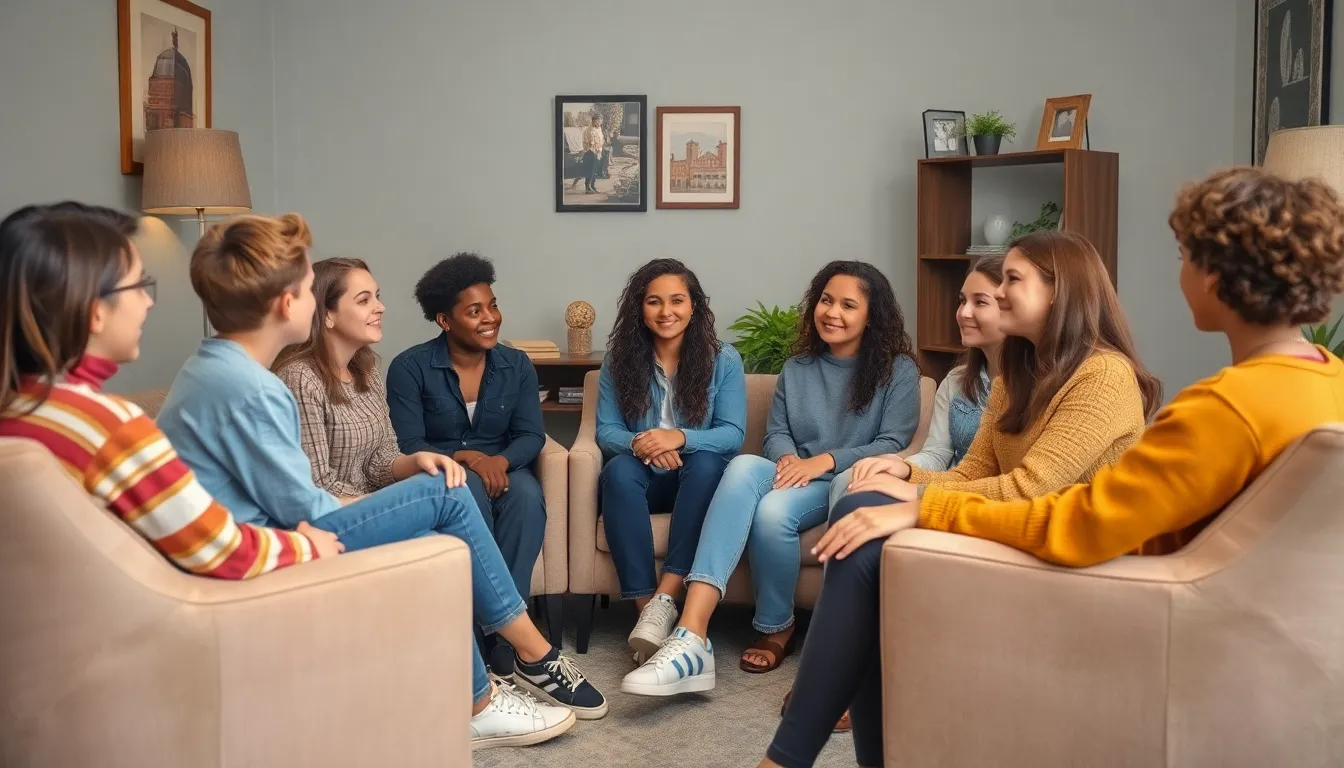Table of Contents
ToggleNavigating the teen years can feel like trying to solve a Rubik’s Cube blindfolded. With all the emotional twists and turns, it’s no wonder many teens need a little extra support. Thankfully, teen counseling options are more plentiful than ever, offering a lifeline for those feeling overwhelmed by life’s challenges.
From traditional therapy sessions to innovative group activities, there’s something for every teen. Whether they’re grappling with stress, anxiety, or just the typical ups and downs of adolescence, the right counseling approach can make all the difference. So let’s dive into the world of teen counseling options and discover how these resources can help turn those frowns upside down—because who wouldn’t want to trade a teenage meltdown for a little peace of mind?
Understanding Teen Counseling Options
Counseling options for teens encompass various methods tailored to individual needs. Traditional therapy sessions often involve one-on-one interactions with licensed professionals, allowing teens to express feelings in a safe environment. Cognitive Behavioral Therapy (CBT) focuses on changing negative thought patterns, helping teens develop coping strategies for anxiety and depression.
Group therapy presents another option, fostering peer support and shared experiences. In these settings, teens learn from one another, gaining insights and building friendships. This approach can reduce feelings of isolation, which often accompany adolescence.
Adventure therapy engages teens through experiential activities. It includes hiking, rock climbing, or canoeing, emphasizing physical activity while encouraging openness and teamwork. Such innovative methods help teens communicate and build trust, often leading to breakthroughs in their emotional landscapes.
Online therapy offers flexibility and accessibility. Teens engage with counselors through video calls or messaging, accommodating varying schedules and comfort levels. This option may appeal to those who prefer privacy or have mobility challenges.
School-based counseling services provide immediate support within familiar environments. Many schools employ trained counselors to address mental health concerns, making resources readily available during school hours. This integration helps destigmatize mental health issues.
Parental involvement is essential in counseling processes. Educating parents about options and encouraging participation can foster a supportive home atmosphere. When families collaborate with counselors, they facilitate more effective healing strategies.
Exploring these teen counseling options enables families to choose the most suitable pathways for their needs. Each approach offers unique benefits, paving the way for healthier emotional development and resilience.
Types of Teen Counseling Options

Teens encountering emotional difficulties can benefit from various counseling options tailored to their unique needs. Here are some popular methods.
Individual Counseling
Individual counseling focuses on one-on-one sessions between a teen and a trained therapist. In this setting, the therapist provides a safe space for teens to express personal feelings and thoughts. They explore specific issues like anxiety, depression, or self-esteem concerns. Cognitive Behavioral Therapy (CBT) is often utilized to help change negative thought patterns. Teens may develop coping strategies and skills during these sessions. Flexible scheduling often accommodates busy lifestyles, making it easier for teens to access support when needed.
Group Counseling
Group counseling fosters peer support by bringing together teens facing similar challenges. Led by a trained counselor, these sessions encourage sharing experiences and feelings in a supportive environment. Engaging in group discussions helps reduce feelings of isolation and encourages empathy among participants. Topics can include emotional regulation, social skills, or stress management. Teens may gain varying perspectives, enhancing personal growth and resilience. Group counseling often helps build strong social networks that last long after sessions end.
Family Counseling
Family counseling involves all family members and focuses on improving dynamics and communication. It aims to address interrelated issues affecting a teen’s mental health, such as parental conflict or sibling rivalry. A trained therapist guides discussions, helping families understand each member’s perspective. Improving communication skills leads to healthier relationships and creates a supportive home environment. The collaborative approach strengthens family bonds and aids in collective problem-solving. When families work together, they can support the teen’s emotional well-being effectively.
Benefits of Teen Counseling
Teen counseling offers numerous advantages that support emotional and mental wellness. It provides a safe space for personal expression and reflection, which can significantly improve overall well-being.
Emotional Support
Emotional support emerges as a core component of teen counseling. Counselors create a trusting environment where teens feel comfortable sharing their feelings. This space facilitates the exploration of complex emotions such as anxiety and depression. Teens gain validation for their experiences and learn they’re not alone in their struggles. By discussing issues openly, they develop insight into their emotional responses. Support from a professional helps them navigate teenage challenges effectively, fostering resilience and self-acceptance over time.
Skill Development
Skill development plays a crucial role in the counseling process. Counselors equip teens with essential coping strategies to address stressors and anxiety. Through various therapeutic techniques, they learn how to manage their emotions more effectively. Skills such as problem-solving, decision-making, and effective communication are emphasized. Teen counseling promotes self-regulation, enabling them to handle conflicts constructively. These learned skills contribute to enhanced interpersonal relationships and encourage personal growth. Over time, they cultivate a sense of autonomy and confidence, which influences future challenges positively.
How to Choose the Right Counseling Option
Choosing the right counseling option requires careful consideration of various factors. Evaluating specific needs plays a pivotal role in this process.
Evaluating Needs
Assessing the unique challenges a teen faces helps tailor the counseling approach. Identifying symptoms such as anxiety, depression, or social struggles guides this evaluation. Parents and teens should openly discuss feelings and experiences. This conversation can clarify whether individual sessions, group therapy, or family counseling best suits them. Understanding preferences regarding therapy styles, including traditional or adventure therapy, remains crucial. Additionally, considering logistical factors like scheduling and convenience enhances the selection process, ensuring that the counseling experience aligns with the teen’s needs and lifestyle.
Finding a Qualified Counselor
Searching for a qualified counselor involves specific steps to ensure a good fit. Researching credentials ensures the counselor possesses necessary qualifications and expertise. Reviews and testimonials provide insights from other families about their experiences. Prospective clients may want to schedule initial consultations to gauge compatibility. During these discussions, asking about therapeutic approaches helps ascertain alignment with a teen’s needs. Additionally, confirming availability for online sessions offers flexibility, accommodating busy schedules. Finding someone who creates a welcoming atmosphere encourages teens to fully engage in the counseling process.
Teen counseling options are vital for supporting adolescents through their unique challenges. With various approaches available, teens can find the right fit for their individual needs. Whether it’s traditional one-on-one therapy or engaging group sessions, these resources foster emotional growth and resilience.
The importance of open communication between parents and teens cannot be overstated. By working together to choose the most suitable counseling option, families can create a supportive environment that encourages healing.
Exploring these counseling avenues can empower teens to navigate their emotional landscapes with confidence, ultimately transforming their experiences into opportunities for personal development and stronger relationships.







